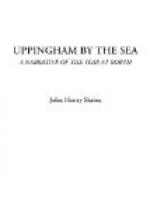Meanwhile the new illustration of this connection of interests had a formidable significance for the Uppingham masters. Men looked at one another as those do who do not like to give a name to their fears. For what could be done? The school could not be dismissed again. How many would return to a site twice declared untenable? But neither could it be kept on the spot: for there came in unmistakable evidence that, in that case, the school would dissolve itself, and that, perhaps, irrevocably, through the withdrawal of its scholars by their parents from the dreaded neighbourhood. Already the trickling had begun; something must be done before the banks broke, and the results and hopes of more than twenty long working years were poured out to waste.
When the crisis was perceived, a project which had been already the unspoken thought in responsible quarters, but which would have sounded like a counsel of despair had the situation been less acute, was suddenly started in common talk and warmly entertained. Why should we not anticipate calamity by flight? Before the school melted away, and left us teaching empty benches, why should we not flit, master and scholar together, and preserve the school abroad for a securer future afterwards at home?
In a space of time to be measured rather by hours than days, this project passed through the stages of conception, discussion, and resolve, to the first step in its execution. On Tuesday, March 7th, a notice was issued to parents and guardians that the school would break up that day week for a premature Easter holiday, and at the end of the usual three weeks reassemble in some other locality, of which nothing could as yet be specified except that it was to be healthier than that we were leaving.
The proposed experiment—to transport a large public school from its native seat and all its appliances and plant to a strange site of which not even the name was yet known, except as one of several possible spots, and to do this at a few days’ notice—was no doubt a novel one. But the resolve, if rapidly formed and daring, was none the less deliberate and sane. Its authors must not be charged either with panic or a passion for adventure. All the data of a judgment were in view, and delay could add no new fact, except one which would make any decision nugatory because too late. It was wisdom in those with whom lay the cast of the die, to take their determination while a school remained for which they could determine anything.




